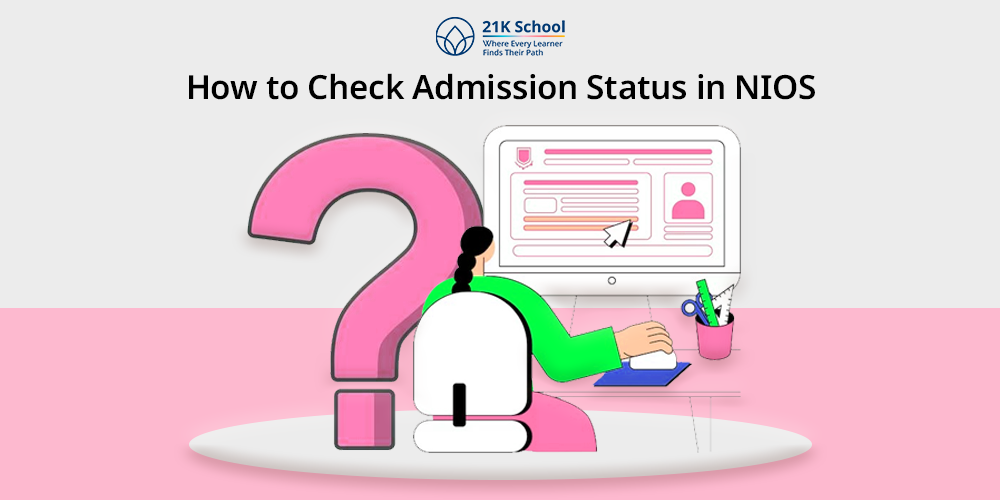
Managing time in a student’s life sometimes seems to feel like a burden that doesn’t fade away.
The pressure of everyday tasks that are assigned wears them out and they don’t find the hours to relax and enjoy their lives well.
But, it must be understood that working with time is a way out of these problems to have a balanced life where limitations don’t overshadow a child’s potential to perform better.
This article will list out top 8 essential tips so that students can improve their time management skills. It will also discuss the importance of time management for students.
Before we delve into that, let’s get the basics first…..
Contents
What is Time Management?
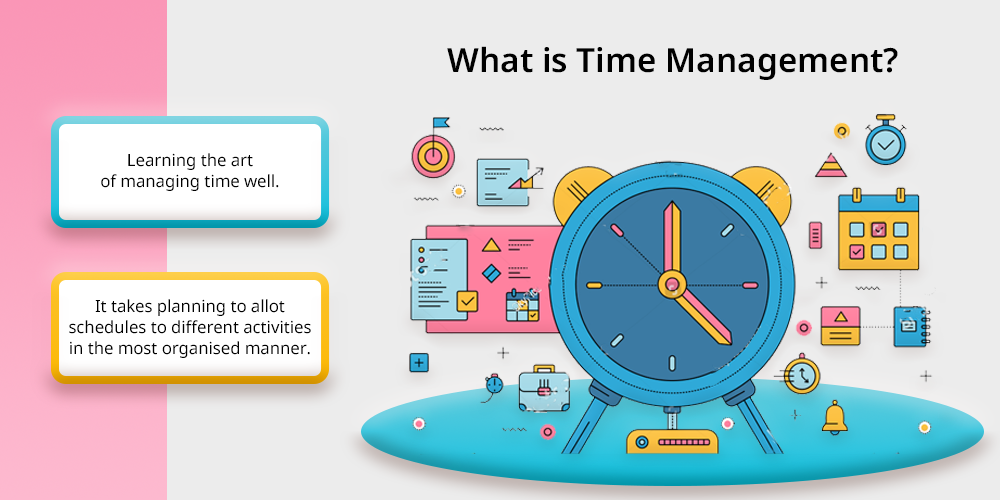
Time management is learning the art of managing time well so that the task completion takes place within the fixed schedules.
It takes planning to allot schedules to different activities in the most organised manner. Situations with a lot of pressure only makes individuals walk the tightrope in deadlines.
When a student progresses in the journey of managing time, they’ll be able to work in a smart way.
The output or the productivity will be higher when students bring these skills to everyday practice. Their grades will scale and they’ll become a better student by all terms.
Why is Time Management Important for Students?
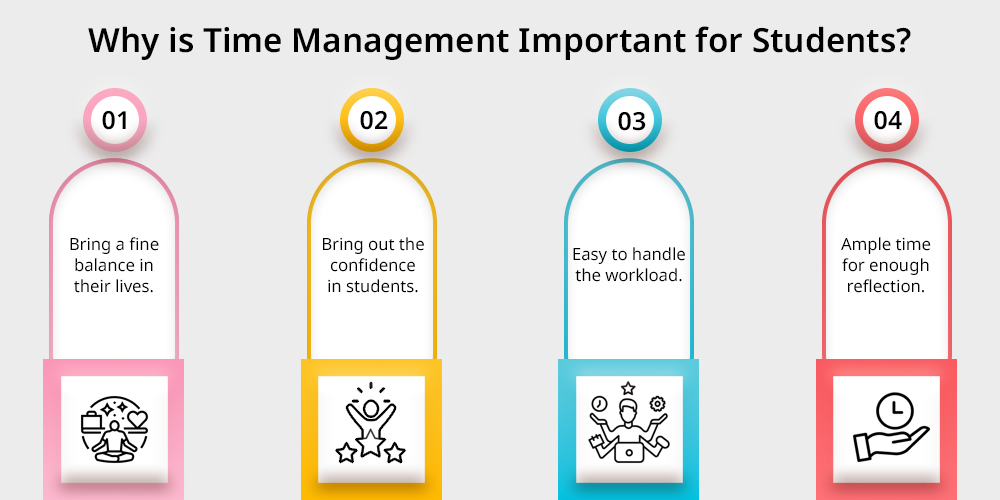
Time is a vital aspect of everyone’s lives without which nothing would progress. It gives a sense of purpose and a direction that is useful in completing any endeavours.
Sometimes time seems to move very fast, especially when it is the matter of deadlines.
Organising things becomes a challenge and one fails to understand why time is not in their favor.
Time management is an effective skill that when learnt and mastered can help one to cope up with the overwhelming tasks everyday.
Students who have to juggle between studies, tuition and other training will find it easy to bring a fine balance in their lives where time management is no longer an issue.
This skill will bring out the confidence in students where they will be more familiar with the way time works.
It is a monotonous situation in which a student has to go on with studies without having a minimum time for rest.
Accepting that time has a big role to play in a student’s progress is a preliminary step to start with the process of effective time management.
The continuous tossing between different engagements can only be dealt with when one knows the secret behind these skills.
Moving forward, individuals will find it quite easy to handle the workload and cover every careeristic milestone. By knowing how to organise things and scheduling them, they will become an expert in the process.
Piles of assignments and projects can make students exceed time frames that will have a bad impression on teachers.
Looking out for a solution can only help to come across a lifetime useful skill of time management.
Additionally, when there is less time, making a quick decision only makes one follow a pathway that is not the ideal.
To avoid unhurried decisions, saving up time is a step that students must willingly follow. Regretting decisions taken in a jiffy helps to realise that there must be ample time for enough reflection.
Top Time Management Tips for Students
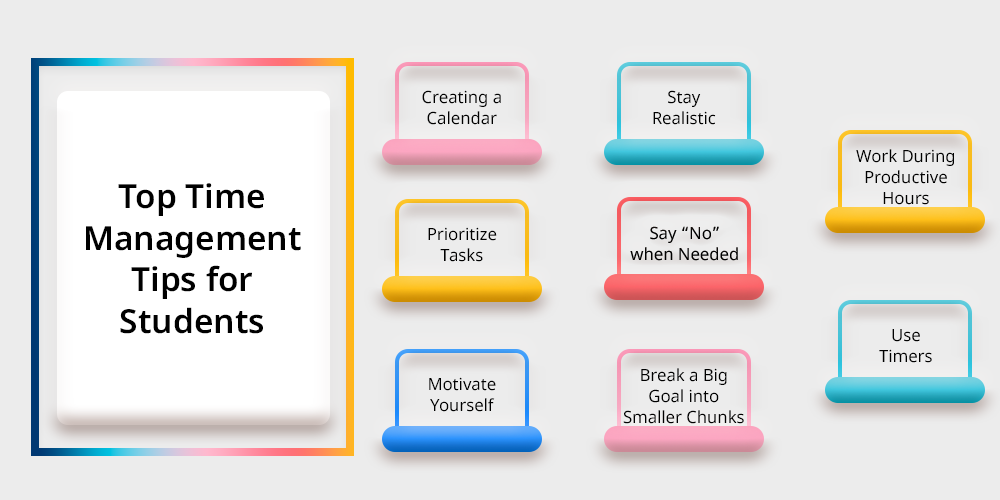
1. Creating a Calendar

Managing tasks is an activity that is very hard to keep up with which makes it all the more apparent that there is a need to look out for things that will make it more convenient.
This is where a calendar comes to the rescue as it will take note of all the tasks that are planned and set for different timings.
Keeping the calendar in sight will make spotting easy and will be a great reminder for all the priorities that must be looked after.
Other than this, there are other apps that can act as a catalyst in improving one’s skill of knowing the way to deal with time.
A planner is a good way to track habits and to be a witness of how a student has progressed in everyday planning and implementation. While a calendar has other uses, a planner is completely designed to help people master these practices.
2. Prioritize Tasks
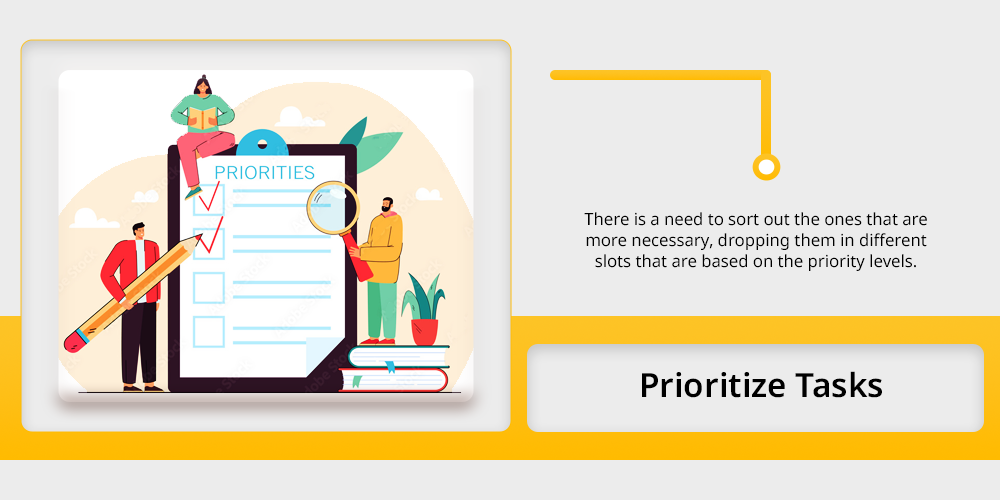
With so many tasks to cover, finding enough time is not something very easy to deal with.
Therefore, there is a need to sort out the ones that are more necessary, dropping them in different slots that are based on the priority levels. This will drive focus in the tasks that call for urgent actions to be taken.
This will help in getting over with the first priorities sooner that can be used for tasks that are marked as secondary or tertiary by their value.
Labelling tasks makes it quite easy to have a clear vision of the tasks that cannot be left unaddressed.
It pushes off the other tasks for later timings so that time can be managed well. There will be no need to stress over the pile of tasks when important ones are sorted out well.
Read to know: How can Students Cope with Study Stress
3. Motivate Yourself
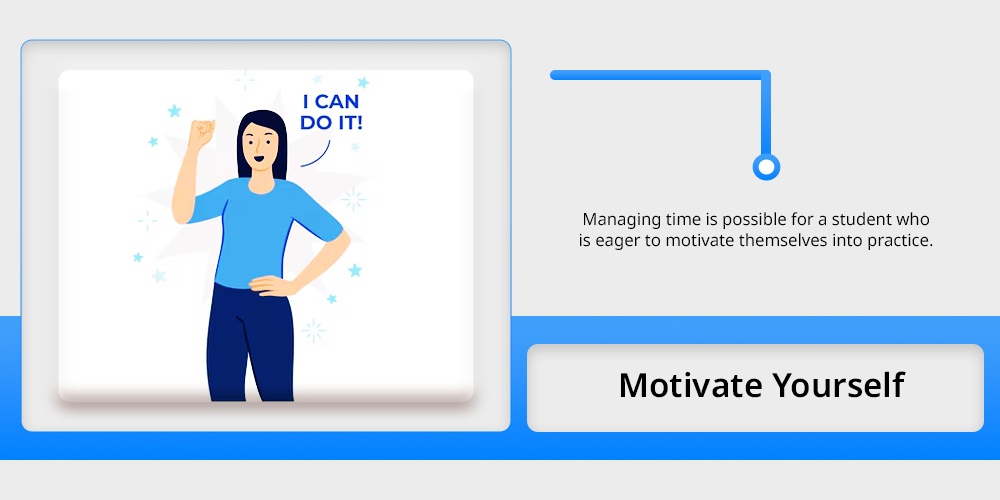
Just like any other goal, managing time is possible for a student who is eager to motivate themselves into practice.
The reward of “finding enough time to spend as one wishes” can offer the much-needed boost for students.
When students prepare their subjects at the earliest and get over with their homework in time, they can make use of the hours for something they enjoy which can be a hobby or going outdoors for a day packed with fun.
Read to know: 10 Homework Tips to Become an A+ Student
Preparing early is the way to complete all the work at a faster rate that will help a student to stay ahead in the competition.
Their performance will soar high when they can dive in the process of mastering and becoming more capable in the management of time.
4. Stay Realistic

Trying to push things harder by doing more in less time is not always realistic.
Therefore, there is an ultimate need for choosing only the time limits that aren’t a display of over expectations. Moving slow and steady is the key to winning the race of time.
Speeding up initially and whiling away the time leaving out duties for later is never a good way to manage time.
Unforeseen circumstances drop in without notice but if a student has utilised the time that was there, they will not be affected by life’s surprises. Adding buffer time is an ideal way to manage delays that weren’t predicted earlier.
5. Say “No” when Needed

Saying no is the need of the hour when there is a greater need to focus on the essentials that are immediate.
When a student manages to say “no” to the things that are meant to deviate them from their main goal, they are likely to be more absorbed in the things that matter to them.
Taking all the tasks together and trying to solve all problems and manage everything at one go is not the way to stay more organised.
Therefore, sweeping away certain commitments to let the mind rest on the priorities is an important part of effective time management.
Keeping cell phones locked away in some other place or simply just avoiding checking for the incoming messages are the simplest ways to not get swayed away by the world of continuous distractions.
Also read about: Ways to Limit Screen Time
6. Break a Big Goal into Smaller Chunks

A large goal is always overwhelming for anyone who is trying to finish things off within a fortnight. It is not the way to accomplish tasks that require a lot of striving and patience.
Therefore, it is required to slice off bigger goals to create pieces of smaller tasks that won’t be that demanding.
The idea of achieving a goal that is huge can be demotivating and students are likely to delay.
As a result, creating something that can be handled easily is the key to assure a journey that is not interrupted by limitations.
By allotting manageable work to certain timings, bigger goals will be completed way before expected hours.
7. Work During Productive Hours
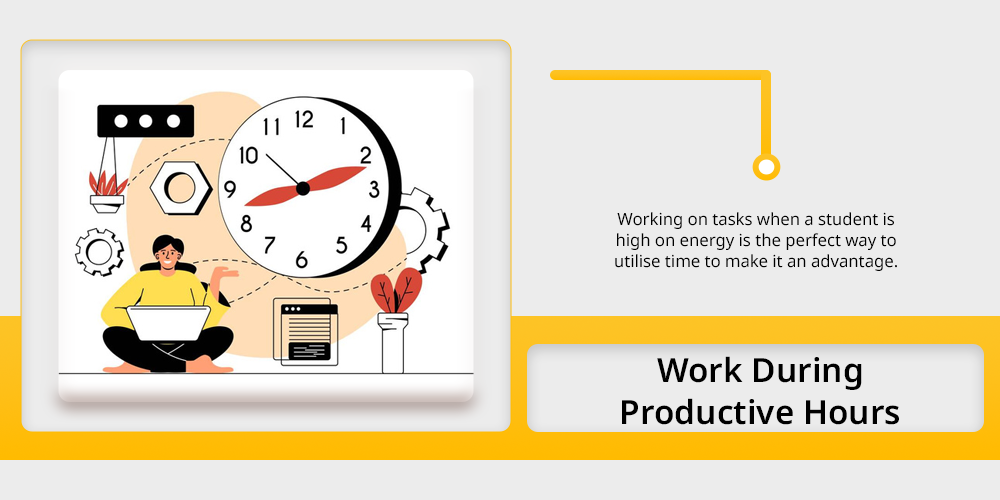
Productive hours of each student are not always the same and may depend on specific factors. Working on tasks when a student is high on energy is the perfect way to utilise time to make it an advantage.
While some may be a morning lark preferring to start early, others might be a night owl deciding to stay awake and study when the surroundings are silent.
Sometimes a nap or a “short period of rest” can be increasingly productive as rest can restore the mental energy and bring revitality.
Therefore, shying away from a quiet moment of peace is all about denying one with a balanced approach to life.
8. Use Timers
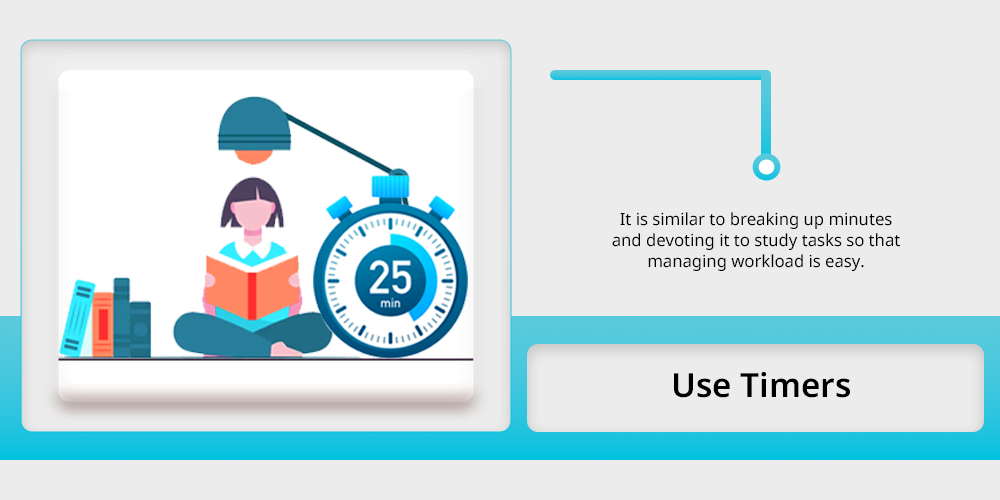
A timer is often the ultimate solution to put a ban on conscious delaying. In this respect, the Pomodoro technique is here to help students to stay focused and also have breaks when necessary.
It is similar to breaking up minutes and devoting it to study tasks so that managing workload is easy.
To start with, a student will have to start with a particular work for 25 minutes that will be interrupted by 5-10 mins of break.
Other than that, simply using a normal timer is a way out to finding a solution that will help in managing time well.
If a student is struggling to make a beginning with the task at hand, starting off with a 5 mins timer will be quite useful in moving beyond the initial inertia.
Conclusion
Time management is not a big deal if you have an idea about where to look for addressing the challenges well.
By following these tips ardently, you can discover that mastering this skill takes time and ample practice.
It is not too demanding not when you realise that moving in harmony with time has always better rewards to give.
Therefore, students who are eager to handle their everyday commitments with absolute ease must without any rumination take up this practice and make it an everyday lifestyle.


